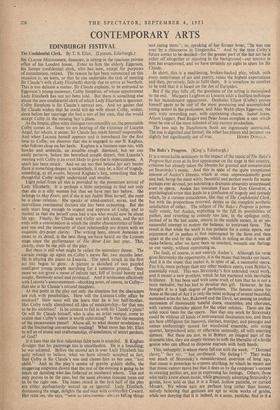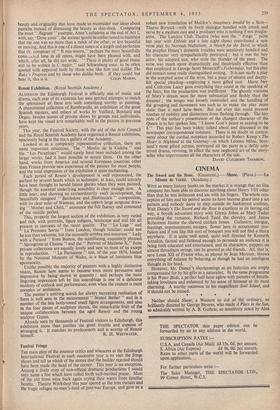IT is a remarkable testimony to the impact of the
music of The Rake's Progress that even at its first appearance on the stage in this country, criticism has already taken the libretto for granted and concentrated on Stravinsky's music. And this in spite of the quite exceptional interest of Auden's libretto, which at once unprecedentedly good and bad, being the most witty, beautiful and perfect words for music perhaps ever devised, yet tolerating a dramatic absurdity unsurpassed even in opera. Auden has mistaken Faust for Don Giovanni, a psychological error that leads to a confusion of tragedy and comedy which, by a curious coincidence, like that of The Confidential Clerk, but with the proportions reversed, denies us the complete aesthetic satisfaction of either. The subject of The Rake's Progress is poten- tially comic, but Auden, exploiting to the full its possibilities of pathos, and reverting to comedy too late, in the epilogue only, instead of in the last scene, resorts in the middle scenes, in an un- successful attempt to restore the balance, to irrelevant farce. The result is that while the work is too pathetic for a comic opera, our enjoyment of its pathos is first interrupted by the farce and then upset at the end by the epilogue, which in telling us that it was all make-believe, after we have been so touched, wounds our feelings or our vanity, without convincing us.
The fault, of course, is not entirely Auden's. Although his verse gives Stravinsky the opportunity, it is the music that breaks our heart. And it is the music that makes it, in spite of all, a successful opera. For it is, more perhaps than any other modern opera, even Britten's, essentially vocal. This was Stravinsky's first extended vocal work, and it meant a new problem, which he has mastered with inevitable brilliance. It has been said with some truth of him that he is not a born melodist, but has had to develop this gift. However, he has brought it to a high degree of perfection. The famous scena for Anne at the end of Act I is only the most striking of several beautiful, sustained arias for her, Rakewell and the Devil, set among an endless succession of memorably tuneful duets, ensembles, and choruses, with various character pieces for the other soloists. These are the solid vocal basis for the opera. Not that any work by Stravinsky could be without all kinds of instrumental fascination too, and there are here obbligatos for bassoon, clarinet, trumpet, and passages and scenes enchantingly scored for woodwind ensemble, solo string quartet, harpsichord solo, or otherwise unusually, all with unerring aptness. But these are not, as in Britten, an integral part of the dramatic idea, they are simply thrown in with the liberality of a fertile genius who can afford to dispense marvels with both hands.
This, unhappily, is where many fall out with the work. " Damned clever," they say, " but cardboard. No feeling ! " They make too much of Stravinsky's misunderstood assertion of long ago, that music is powerless to express anything, by which he meant not that music cannot move but that it does so by the composer's success in creating perfect art, not in expressing his feelings. Others, those who really know about music, while graciously admitting Stravinsky's genius, have told us that it is a fraud, hollow pastiche, or curried Mozart. We whose ears are perhaps long rather than keener, naively believing that geniuses are apt to write works of genius, while not denying that it is indeed, in a sense, pastiche, find in it a beauty and originality that have made us reconsider our ideas about pastiche instead of dismissing the beauty as skin-deep. Comparing the most " flagrant " example, Anne's cabaletta at the end of Act 1, with, say, "Dove sono", the accuser w,ould be embarrassed to maintain that the one was no more than a mock of the other, or less beautiful or moving. And this is one of a dozen tunes of a length and perfection that th composer of " II mio tesoro," perhaps the most beautifully consti ,,etcd tune in all opera, might have been pleased with, and which, after all, he did not write. " There is plenty of good music still to be written in C major," said Schoenberg once, to be often quoted with approval both by those who like him and dislike The Rake's Progress and by those who dislike both. If they could but



































 Previous page
Previous page